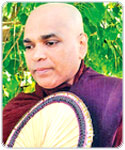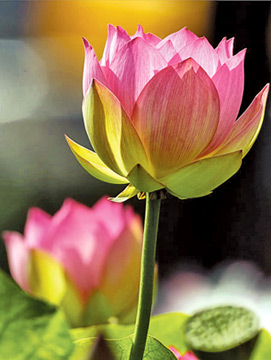
On this Vesak Day:
A Reminder to the Way of
Dhamma
 Dr. Most Venerable Dr. Most Venerable
Mirisse Dhammika Nayaka Thera
The greatest benefit gained by using the rare opportunity to be born as a human
being is the chance of enlightening ourselves on dhamma and practicing in order
to end the suffering of the samsara. Even though repeatedly mentioned, why don’t
many people contemplate on refraining from the five main akusalakamma and ten
akusalakamma? The reason for this is the lack of understanding about the value
of rarely born human life. According to the preaching of the Buddha, all beings
that are born in thirty-one Sakwalas had been born in the four lower worlds in
their previous births. For not being ableto get free from the four lower worlds,
they had undergone immence suffering for long Kalpa. Their hads had been
decapitated when they were goats, chicken and oxen. Hence, it is noted that the
amount of blood flown is more than the quantity of water in the ocean. Being
born in the ghost realm, they had consumed filthy food and had been subjected to
enormous agony and misery, unfathomable in words. Don’t you and I understand the
value of being rarely born as a human being when we closely examin the animal
realm, which is one of the lower world’s, with our naked eye? We should not be
anxious of our complexion, height or size we got from our birth, if there isn’t
a disease.
 The Sila made of mind must be maintained in a conventional state and according
to the one should not neglect to remember the true state of the present life and
also must contemplate on the true state of the woeful samsara. It is most
significant to get into the way of dhamma and obtain benefits as sermonized by
the Buddha with his distinguished wisdom and immence compassion. Postponement of
gaining access to the way of dhamma and hesitate to gain benefits should not be
done. The reason for this can be brought forward as even though conventionally
it is said that one can have a life span of hundred years, yet many people do
not have such a long life span. From the moment an embryo is placed in a
mother’s womb, death can occur at any moment. Even during the imprecisely called
life span of hundred years, one has to spend it with painful diseases, decaying,
separation from loved ones, disregarding unpleasant resolutions. Frustration and
grief are generated when things do not happen the way you expected, and one
would also have to lead a life with cryings, lamentations with a sad-mindedness
while reflecting repeatedly the rhetoric question. The Sila made of mind must be maintained in a conventional state and according
to the one should not neglect to remember the true state of the present life and
also must contemplate on the true state of the woeful samsara. It is most
significant to get into the way of dhamma and obtain benefits as sermonized by
the Buddha with his distinguished wisdom and immence compassion. Postponement of
gaining access to the way of dhamma and hesitate to gain benefits should not be
done. The reason for this can be brought forward as even though conventionally
it is said that one can have a life span of hundred years, yet many people do
not have such a long life span. From the moment an embryo is placed in a
mother’s womb, death can occur at any moment. Even during the imprecisely called
life span of hundred years, one has to spend it with painful diseases, decaying,
separation from loved ones, disregarding unpleasant resolutions. Frustration and
grief are generated when things do not happen the way you expected, and one
would also have to lead a life with cryings, lamentations with a sad-mindedness
while reflecting repeatedly the rhetoric question.
“Why was I born to undergo such severe suffering?” , one would lead the life
with a constant fear of death. We are unaware of how long a life span we have
and what sort of a karmic volition we have brought in. We can’t definitely say
what sort of diseases we already have and will energy in our bodies which are
filled with thirty-two impurities.
Hence, when we have a clear mindfulness and a healthy physical strength, it is
wise to train the mind and the consciousness to observe and contemplate on the
way to dhamma.
Let’s observe further. Anything thought, spoken or done with a soul mind would
yield painful results; further, anything thought, spoken or done with a pure
mind, would produce virtuous results. Taking into consideration that all the
persons are bequeathed with karma and that karma bring results in each instance,
we should determine to nurture a pure mind at the present moment. As a follower
of the Buddha, what is thought in the conscious mind, before it is spoken or put
into action, you should think weather it is beneficial or detrimental not only
for yourself but also for others. If what was thought is beneficial for you and
others, implement it at the appropriate time and in a suitable way. If it is
detrimental, you should examine your mind to see whether you have a well
fortified determination not to implement it but to follow the dhamma way, even
if you are offered pearls, jems, gold or a billion in currency. One should
contemplate on how the observed sila, which shouldn’t be limited to worlds but
the meaning thoroughly regarded while safeguarding sila, is extremely helpful to
gain Samadhi and wisdom. The Buddha has preached a monk living according to
morality consisting in restraint with regards to the disciplinary code should
engage in devotional observances while perceiving he danger in not only even in
the smallest offence but also in the minute offence while observing the moral
rules. Morality manifested in speech and bodily action (sila) should be
practiced with extreme understanding. It is also important for people who engage
in their household chores, to have a fondness, a respect and an understanding
towards sila.
 Wisdom gets purified by sila. In return, sila gets refined by wisdom. Wisdom is
generated when there is sila. Wisdom initiates sila to focus on nirvana. One who
has sila, possesses wisdom. Simultaneously, one who has supreme wisdom possesses
the noble morality. It is considered that the greatest and the most significant
in the word issila and wisdom. Wisdom gets purified by sila. In return, sila gets refined by wisdom. Wisdom is
generated when there is sila. Wisdom initiates sila to focus on nirvana. One who
has sila, possesses wisdom. Simultaneously, one who has supreme wisdom possesses
the noble morality. It is considered that the greatest and the most significant
in the word issila and wisdom.
Engage in livelihoods that are not detrimental not only to you but also to
others paying attention to dhamma, always perceive that the wealth earned in a
evil way can be compared to an enormous fire and a flow of larva, as not only
you but also people who use them too, would face drastic consequences in this
world as well as in births beyond death. Recollect on the purity of your sila
which is unbroken and untarnished and contemplate on the good consequences
generated in it. This is called the meditation of morality. When sila, which is
the foundation of the eightfold path is purified, experience a condition which
leads to generate Samadhi and wisdom in the mind.
As mentioned in the MeththaSuthra, be a person who is engaged in few deeds with
simple, uncomplicated behaviour; further, to be a person who can be easily
nourished. Guide and train your mind to be get provided only with things that
fulfill the most essential needs. By not yielding to the endless desires,
gradually terminate the habit of accumulating goods. Contemplate on the state of
your mind, when giving up, even little by little, the ownership of the goods
that you have collected so cravinly and inculcate the habit of donating. Be
conscious to recollect on your donations with out a vision of stinginess,
infatuation and conceit. This becomes the chaganussathi mediation.
Do not be a person who always points out mistakes in others and who always tend
to criticize others destructively. Perceive on yourself to ponder whether you an
accurate person in the way of dhamma as the Buddha sermonized. Eliminate all the
thoughts in your mind such as, ‘That person scolded me, talked wrong of me and
grabbed all’ what was mine”. Otherwise, remind yourself that if you harp on
those thoughts as unwholesome perceptions and formations they will deviate you
from the happy course of existence towards the woeful course of existence.
|